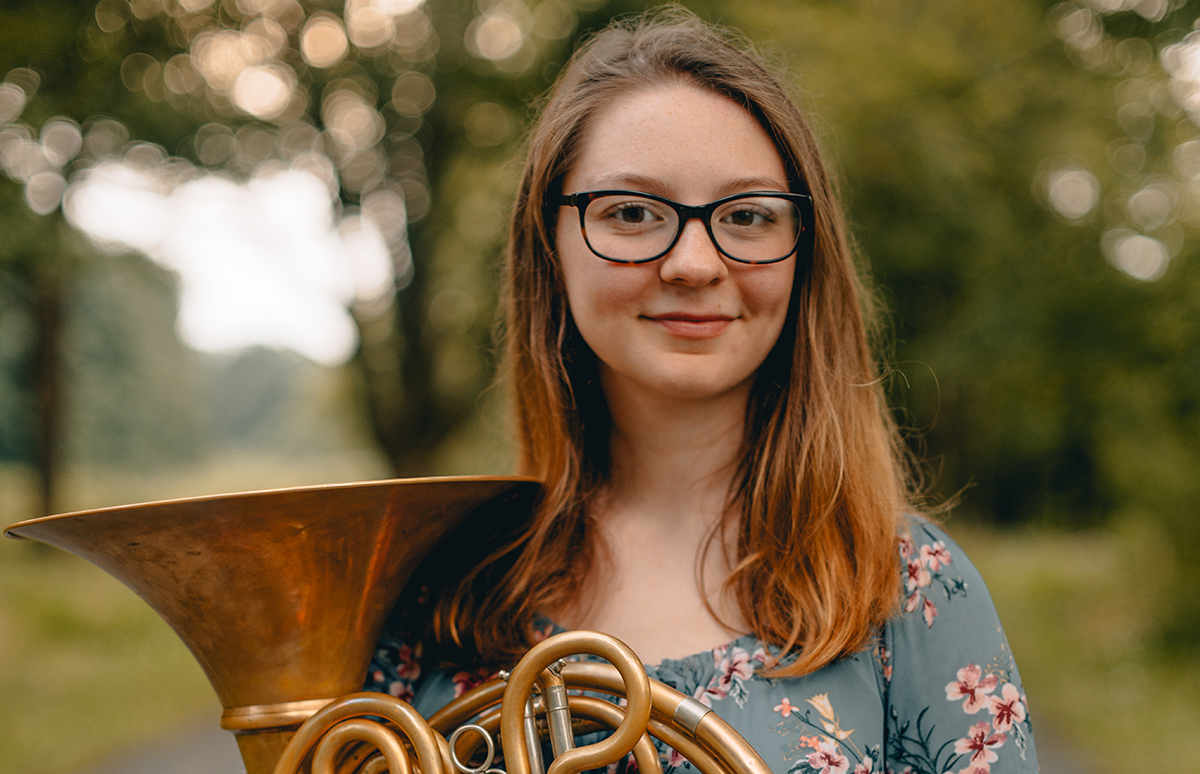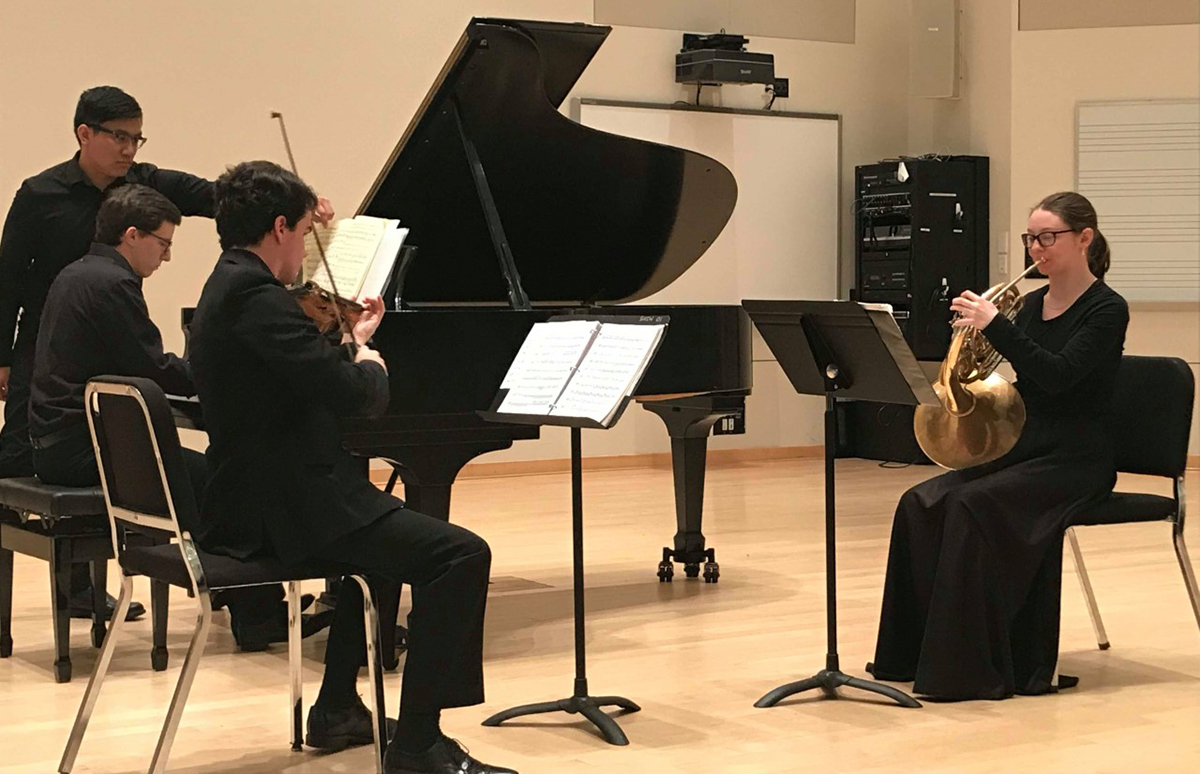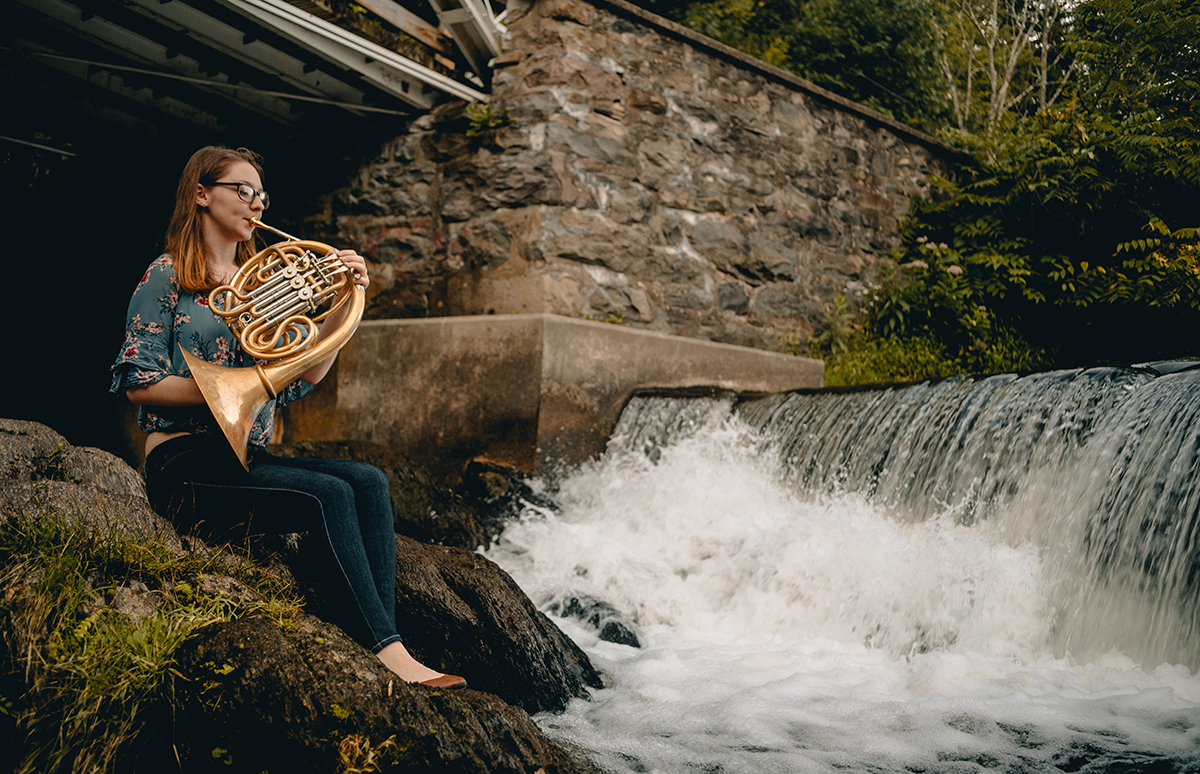Stephanie Fritz (’20, MGSA/HC) has dedicated her young life to music, spending hours daily on the work of perfecting the sounds she creates playing one of the most difficult instruments—the French Horn. Her hard work has paid off. She won the Mason Gross School of the Arts annual Rutgers Sinfonia concerto competition in her junior year, and she is the only horn player in the country to be recognized at the 2019 Yamaha Young Performing Artist Competition. She has received the Vargas/Vetter-Ukena Fellowship with the New York Youth Symphony and has been accepted to Yale University to pursue an MM (Master of Music) at the Yale School of Music in the fall.
Every opportunity has required an extraordinary amount of time and preparation in selecting, learning, and recording the perfect audition. As she prepared for grad school, summer festival, and professional auditions last fall, Stephanie learned and performed 6 solos and 38 orchestral excerpts. Each opportunity had slightly different requirements and demands.
For her Yamaha audition, she chose a diverse range of time periods and composers—Mozart, Beethoven, Strauss, and Messiaen—to showcase such special effects as lip trills, flutter tongue, half-valve, and glissandi. By the end of the recording session, she had played each solo 30-40 times and each excerpt 70-100 times. Creating an audition recording is physically, mentally, and emotionally taxing, but brings its own rewards: “I recorded my audition at about 1:30am to minimize the chance of someone interrupting. It was one of the most ethereal experiences. Filling Schare Recital Hall with the eerie sounds of Messiaen's Interstellar Call...at that moment, I felt like I might've actually been in outer space.”
Stephanie’s success has come from sheer drive and deep interest. As a child growing up in Stroudsburg, PA, she started playing the piano at 6, violin and trumpet at 9 and 10, and the horn at 12. She played horn in the band and orchestra, lead trumpet in jazz band, mellophone in marching band, and piano for the choirs. She learned the French Horn, an instrument she was drawn to for its ability to sound either dark, bright, intimate, heroic, or distant, by watching YouTube and reading wikiHow articles on “How to play the Horn.” Without a teacher at a young age or access to summer music programs, she had to rely on herself: “I started in a place where I always felt like I had to catch up.” When she arrived at Mason Gross she was placed in the school’s lowest band. With her eye on playing with the best around her, she “prepared like crazy” and by her sophomore year, she had achieved the level of principal horn in the top orchestra.
She attributes her success to her teacher, Richard Deane, Acting Principal Horn of the New York Philharmonic and expert in the technical aspects of horn playing. Since the fall of her sophomore year, Stephanie has been recording her lessons with him to understand how she progressed so quickly. For her capstone, she has transcribed her lessons to analyze, in particular, her technical growth. She shared, “When I first got to Mason Gross, I would say something like, ‘I'm not sure where my air is supposed to go.’ Now I would say, ‘The inside of my mouth is too small. I'm compensating because there's no muscular cohesion around my mouth."
As much as Stephanie has focused on improving her own skills, she emphasizes her role as part of a larger ensemble, whether it’s an orchestra or a marching band. That means developing a truly intimate knowledge of the music and the other instruments’ roles. “There's a lot of personal responsibility in such settings...what can I bring to the table?” By knowing her own part, as well as others’ parts, she says she can help create the best possible musical experience. For example, in a recent performance of Rimsky Korsakov’s Scheherazade, “the clarinet played a motif just before I did and, because I had internalized each instrument’s role in the piece, my mind was open and I was present enough to hear and respond to the clarinet player’s interpretation of the line. I feel like I've evolved to where I can really listen to what people around me are doing and have a musical conversation with them on stage."
For her interdisciplinary seminar Honors College requirement, Stephanie took “Total Work of Art” taught by Dr. Anette Freytag of the School of Environmental and Biological Science’s Department of Landscape Architecture. The course focused on “gesamtkunstwerk," which is the collaboration of all art forms into one to create an aesthetic. Stephanie chose to write about Russian composer Igor Stravinsky’s The Rite of Spring, a work created with impresario Sergei Diaghilev’s Ballets Russes, Vaslav Nijinsky's choreography, and Nicholas Roerich’s costume and set design. “The debut resulted in something so new that it caused riots. The music and choreography happened in exact rhythm (eurythmics), and specific, intricate designs in the costumes paralleled the exact choreographic movements of the dancers wearing them. Artistic decisions were made simultaneously and the collaborators were informed by each other’s creative processes, which subconsciously intensified the ballet’s jarring effect on the audience. This inspired, within myself, a deep sense of purpose for live collaboration. When I perform with other musicians, we are doing more than just taking something from the past. We are participating in sensitive, on-the-spot collaboration and actively inspiring each other’s next steps. In life, having an open mind and heart to those around us can result in wonderful moments and connections like those found in live performance.”
Stephanie’s goal is to play horn with a major orchestra, perform chamber music professionally, and to teach and inspire students who may not currently have access to private teachers or other resources that anything is possible if you are truly passionate about your dreams. Her advice to others?
There is always room at the top. Be prepared. You never know when your door will open, so you have to be ready now. In music and beyond, know your role, know your colleagues' roles, and know the material you are working with so that you can collaborate and create something extraordinary in the moment.
Meet Class of 2020 graduate and French horn player Stephanie Fritz.
When she couldn't find a French horn instructor in Pennsylvania, Stephanie taught herself to play one of the world's most difficult instruments through YouTube videos. Today she is the first horn player at Mason Gross School of the Arts to win the annual concerto competition and the only horn player in the country recognized at the 2019 Yamaha Young Performing Artist Competition.
Learn more about her advice to students who want to pursue music professionally.
"You aren't dreaming big enough. Dream bigger because everything is possible."


